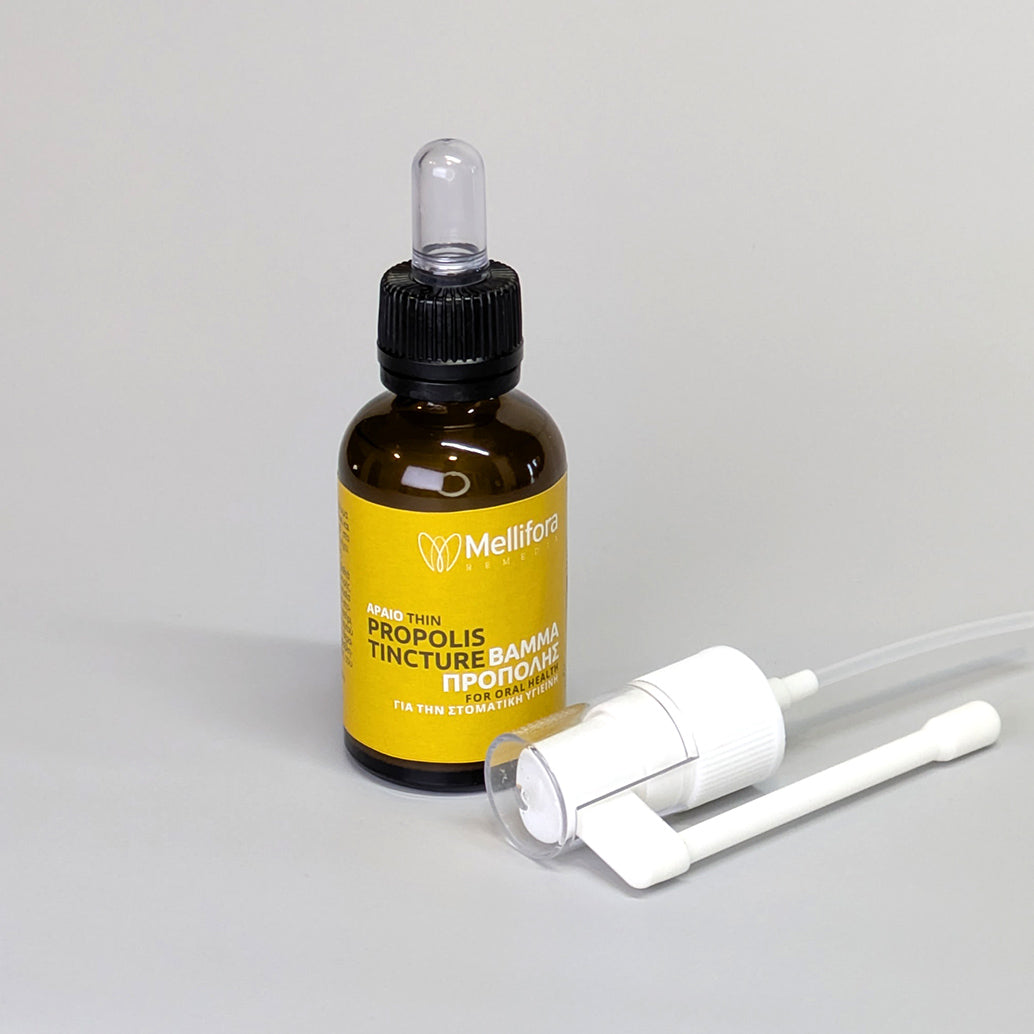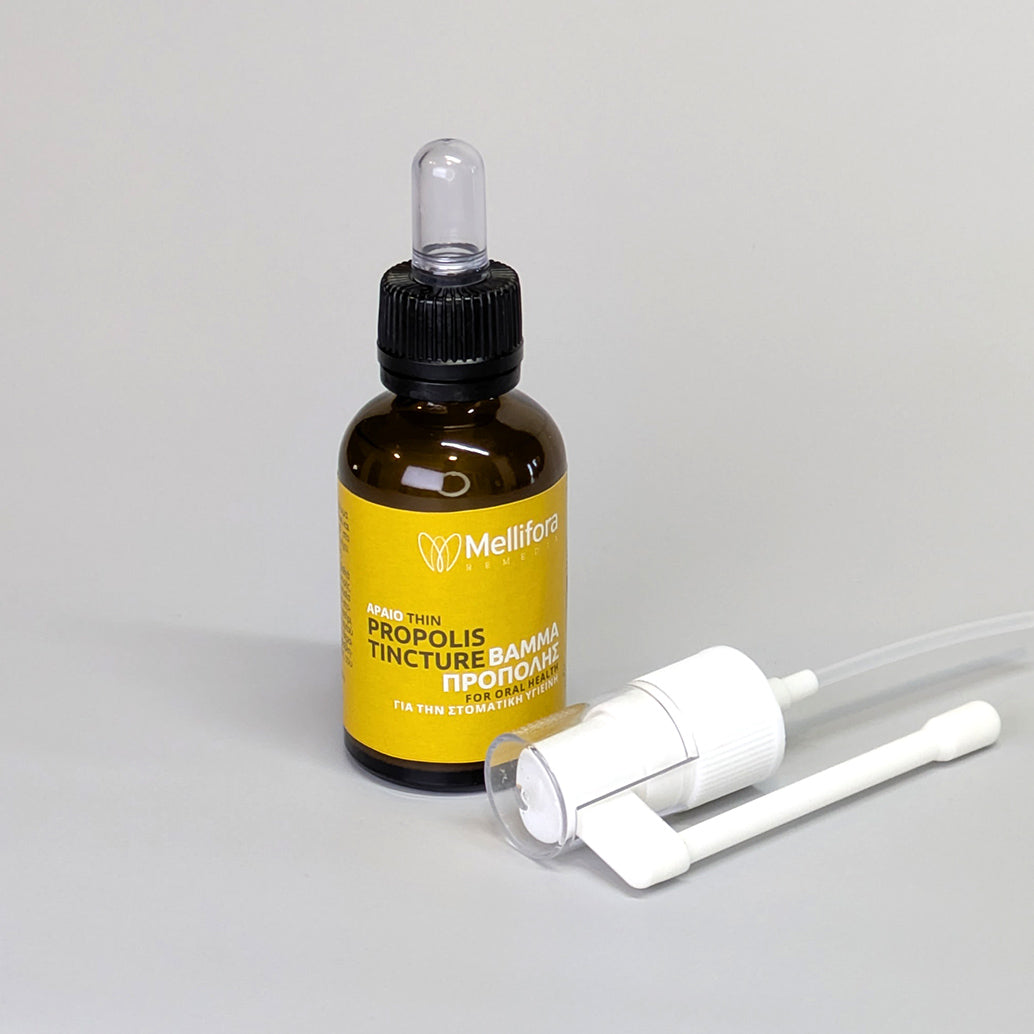Mellifora
Propolis tincture-thin
Propolis tincture-thin
Couldn't load pickup availability
- Description
- Way to use
- What is propolis
- Relative products
Best for internal use: Disinfectant, therapeutic, healing, for oral health, throat, stomach and the immune system. 30ml
Thin propolis tincture contains propolis extract in 20 degrees alcohol. Available in bottle with dropper and mouth spray.
Oral use:The diluted propolis solution does not stain and becomes more tolerable in the throat as it contains less alcohol. Drop 5 drops deep in the throat, three times a day.
For the immune system and stomach: drink a small amount of water with 10 drops of tincture twice a day on an empty stomach.
Bees use propolis in a number of ways in the hive. One use is to prevent entrance to the hive when they are in danger, protecting their community from various enemies, either large in size, like mice or microscopic ones, like microbes and viruses. This powerful substance shields the magical world of bees.
The therapeutic properties of propolis, called "black wax" at the time have been known since antiquity. Using propolis, bees sterilize the hive and protect themselves from infections. In addition, bees use it as construction material in the hive, filling cracks and cavities. The beekeepers gather this precious material from the walls and panels of the hive. Bees polish the interior beehive cells all year long, ensuring that the egg produced by the queen will grow in a sterilized environment and produce a healthy pupa and larva.
Use of PropolisPropolis comes from resinous substances which are gathered by the bees from tree trunks. Bees mix it with wax and pollen and they enrich it with trace elements, amino acids and vitamins (B3, K). Thus, the basic composition of propolis is 50% resin, 30% wax, 10% volatile oils, 5% pollen, enzymes, aromatic substances, sacchars, balsams and various other components. Its chemical composition and its natural properties are dependent on the flora of each region, since different plants provide the bees with different resinous substances. This is why the color of propolis is far from constant. It varies from dark green to brown to white yellow. It has a pleasant aroma, like incense, vanilla and wax mixed with honey. Its aroma depends on the volatile oils it contains. It cannot be dissolved in water, but it is dissolved in alcohol, glycol and other organic solvents.
Therapeutic properties of propolisEgyptians were aware the antiseptic properties of propolis and they utilized them in the mummification process. Ancient Greek and Roman therapists, like Dioscoride, Pliny and Galen viewed propolis as antiseptic and disinfectant. In the 17th century, the London pharmacopoeia listed propolis as an official medicine.
The beneficial action of propolis is now proven. Lab experiments illustrated its antimicrobial and anti-fungal action, since it inhibited the action of 25 bacteria in a total of 29 and it inhibited the growth of 20 species of fungi among 39. It has been proven effective against the viruses of polio, herpes, stomatitis and adenitis. Moreover, it is effective for parasites like trichomonas, trypanosome and etc.
The use of propolis with antibiotics decreases the side effects of the latter. More importantly, the long-term use of propolis does not lead to resistant pathogenic microorganisms, while it easily destroys pathogens resistant to antibiotics. Propolis acts against staphylococcus and streptococcus, which cause infections in the oral cavity. It contains antibacterial substances and prevents the flu and hepatitis. In addition, propolis is antioxidant and protects vitamin C against oxidation. It has been reported that propolis in combination with pollen can help alleviate allergies. Finally, it accelerates the healing of damaged tissue, mainly due to the essential oils.
Use of propolisPropolis is used to treat external and internal injuries in the respiratory system and the oral cavity. It is used against gastric ulcer, prostate problems, gynecological problems, mycosis, and virosis. It can help in chronic otitis, sinusitis, rheumatic arthritis and spinal ankylosis. It has positive effects in treating vasomotor nerves that cause sniffles. It is therefore the main component in cosmetics, facial creams, soaps, shampoos, and toothpastes as well as in a number of therapeutic preparations, like pastilles for sore throat, cough syrup, potables for stomach and immune system etc.
The therapeutic uses of propolis and other bee products are so many that there is a whole new science called Apitherapy.
From this aromatic and pure propolis, we make dilutions and oil extracts using scientific knowledge and methods, making sure to preserve all the therapeutic qualities. Our product is available in this form or in a dense tincture or in preparations like cosmetics, soaps and therapeutic products, like
Share
You will get 10% cashback on this order.

Ειχε πονολαιμο το παιδι και ο αντρας μου και απο την πρωτη εφαρμογη εκανε δουλεια. ειναι τελειο . δεν υπαρχει καλυτερη λεξη για να το περιγραψω
Είναι πραγματικά θαυματουργή η πρόπολη. Δώρο της φύσης.
Η υφή του εξαιρετική και η αποτελεσματικότητά του ευεργετική! Πολύ σημαντικό το γεγονός ότι δεν λεκιάζει τα δόντια (σε αντίθεση με το πυκνό) και ευχάριστο στη γεύση. Είναι κατάλληλο και πολύ αποτελεσματικό για μικρά παιδιά! Μπορεί να συνδυαστεί συγχρόνως και εύκολα με το αντιβηχικό σιρόπι! Σας ευχαριστούμε πολύ!
Πόναγε ο λαιμος μου και το ψεκασα μερικες φορες κ σταματησε ο πονος. Επισης ενιωθα το κρυολογημα να ερχεται αλλα επινα καθε πρωι και μου περασε χωρις να με πιασει καλα. Γενικα αρρωσταινω πολυ ευκολα.
Όλα τέλεια
Το χρησιμοποιούμε σε πολλά προβλήματα υγείας,στο δέρμα, ακμή, ιώσεις, έρπητα στα χείλη...
Πολύ αποτελεσματικό!






